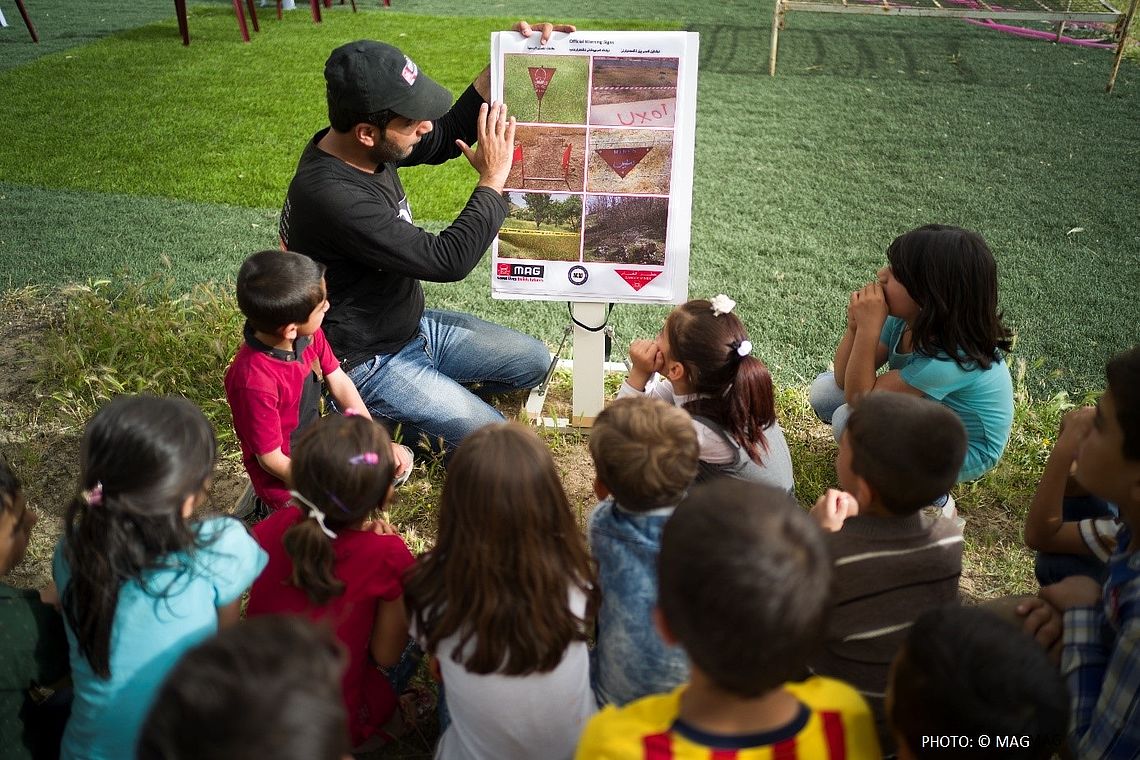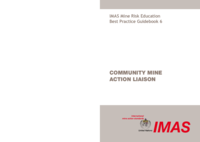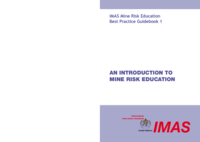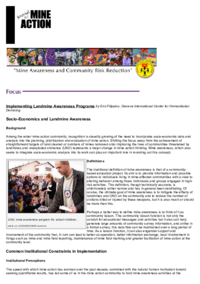The term ‘Explosive Ordnance Risk Education’ (EORE) refers to activities which seek to reduce the risk of injury from explosive ordnance by raising awareness of women, girls, boys and men in accordance with their different vulnerabilities, roles and needs, and promoting behavioural change. (IMAS 12.10).
The objective is to reduce the risk to a level where people can live safely, thus contributing to an environment where economic and social development can occur free from the constraints imposed by explosive ordnance contamination. In recent years, high numbers of civilian casualties from explosive ordnance have been recorded. Effective EORE interventions with affected individuals and communities – in addition to other risk reduction programmes – are critical to prevent injuries and save lives.
To contribute to enhancing the protection of civilians, the GICHD has strengthened its EORE efforts, in support of partners across the mine action and wider humanitarian and protection sectors.
What does the GICHD do in EORE?
The GICHD follows a multi-pronged approach that entails global, regional and country-specific EORE advice, technical assistance, exchange of good practice, research, and innovation.
Support to partners is strengthened through the mainstreaming of EORE into the GICHD’s four lines of service: capacity development and advice, multilateral work on norms and standards, facilitation of dialogue and cooperation, and research and development focused on innovative EORE solutions.
The EORE programme at the GICHD works towards:
- Reinforcing capacity for locally-led responses
- Developing and promoting innovative EORE responses to address challenges
- Increasing commitments and resources allocated to EORE

At the global level, the GICHD contributes to strengthening the profile of EORE through its role as secretariat and core member of the EORE Advisory Group, as well as convention-related support (Anti-Personnel Mine Ban Convention, Convention on Cluster Munitions) and the production of sector-wide resources for practitioners.
At the regional and country level, the GICHD provides EORE-specific support, both directly to its partners and through other means, such as within the framework of mine action strategic planning processes, the drafting and/or revision of international and national standards, the facilitation of exchange of good practices and the mainstreaming of gender, diversity and inclusion considerations.
This 'Mapping and Needs Analysis' of the explosive ordnance risk education (EORE) sector updates the GICHD's 2019 study, showcasing progress over the past five years. Through surveys, interviews, and desk research, the report offers insights to guide future EORE priorities. It provides findings, good practices, and actionable calls for action across critical areas like humanitarian disarmament, funding, and quality management. In today's world of increasing conflicts and crises, this practical resource aims to boost commitments and resources for EORE, serving as an essential tool for the sector and its partners.
Summary of key findings and calls for action
In English: Sector mapping and needs analysis: summary of key findings and calls for action
Introduction to EORE Essentials
Objective:
This introductory course is for anyone interested in learning about the key principles of effective and ethical risk education. It is intended to support mine action practitioners and stakeholders from other sectors to identify why EORE matters and how it can be integrated beyond humanitarian mine action.
Duration: approximately 60 to 90 minutes
Languages: Arabic, English, French and Ukrainian
‘Advanced EORE’ e-learning
Objective:
This Advanced EORE course is primarily for EORE practitioners. It is intended to support EORE practitioners to acquire common foundations on the EORE project cycle: planning & analysis, design, implementation and monitoring, evaluation, accountability and learning (MEAL).
Duration: approximately 8 hours
Languages: English and French
IMAS 12.10 – Explosive Ordnance Risk Education
Find out more about the latest version of the International Mine Action Standard (IMAS) on EORE, updated in 2020. Available in Arabic, English, French, Korean, Russian and Vietnamese.
TNMA 12.10/01 - Risk Education for Improvised Explosive Devices
Read more about specific considerations for the effective assessment, planning, implementation, management, monitoring, and evaluation of risk education for IEDs.
TNMA 05.10/01 - Measurement and reporting of beneficiaries
This Technical Note for Mine Action provides additional guidance on the measurement and reporting of beneficiaries defined in IMAS 05.10, Annex B., including for EORE activities.
EORE in Conventions
Convention on Cluster Munitions (CCM): Find out more about the Lausanne Action Plan (2021-2026), including Section VI dedicated to risk education (actions #27-30).
Anti-Personnel Mine Ban Convention (APMBC): Find out more about the Oslo Action Plan (2019-2024), including Section VI on mine risk education and reduction (actions #28-32).
EORE Advisory Group
The EORE Advisory Group (AG) is a group of over a dozen organisations that provides overall guidance to the sector and identifies ways to improve the integration, effectiveness, efficiency, and relevance of EORE. Find out more about the advisory group, its two-year workplan and a wealth of resources for practitioners
EORE Game Changers
The EORE game changers campaign shares the stories of five EORE experts who are making a difference in the field.
Meet the people in explosive ordnance risk education (EORE) who will not stop until the world is safe.
Social and Behaviour Change Communication Toolkit
Social and behaviour change aims to empower individuals and communities, and emphasises participation, co-creation and partnerships to achieve positive change. Social and behaviour change communication (SBCC) is the strategic use of communication approaches to promote changes in knowledge, attitudes, norms, beliefs and behaviour.
EORE Publications

- Available in English
International Mine Action Standards for Mine Risk Education - Best practice guidebook
UNICEF entered into a partnership with the Geneva International Centre for Humanitarian Demining to develop the Best Practice Guidebooks. The series will provide practical advice for implementing the mine risk education component...

- Available in Vietnamese

- Available in English
Displaying results 41 to 43 out of 43
- « Previous
- 1
- 2
- 3
- 4
- 5
At the Lebanon Mine Action Centre, we encourage all our staff involved in humanitarian operations to complete the full GICHD EORE e-learning journey in order to improve the development and implementation of EORE interventions and to further support the integration of risk education in our mine action operations.




